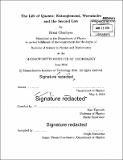The life of quanta : entanglement wormholes and the second law
Author(s)
Gharibyan, Hrant
DownloadFull printable version (9.075Mb)
Other Contributors
Massachusetts Institute of Technology. Department of Physics.
Advisor
Max Tegmark.
Terms of use
Metadata
Show full item recordAbstract
This thesis explores two different topics in physics. The first is related to the study of the ER = EPR conjecture that relates the entanglement entropy of a collection of black holes to the cross sectional area of Einstein-Rosen (ER) bridges (or wormholes) connecting them. We show that the geometrical entropy of classical ER bridges satisfies the subadditivity, triangle, strong subadditivity, and CLW inequalities. These are nontrivial properties of entanglement entropy, so this is evidence for ER = EPR. We further show that the entanglement entropy associated to classical ER bridges has nonpositive tripartite information. This is not a property of entanglement entropy, in general. For example, the entangled four qubit pure state IGHZ4) = (I0000) + (I1111))/[square root]2 has positive tripartite information, so this state cannot be described by a classical ER bridge. Large black holes with massive amounts of entanglement between them can fail to have a classical ER bridge if they are built out of IGHZ4) states. States with nonpositive tripartite information are called monogamous. We conclude that classical ER bridges require monogamous EPR correlations. The second is a generalization of the second law of thermodynamics. We prove a generalization of the classic Groenewold-Lindblad entropy inequality, combining decoherence and the quantum Bayes theorem into a simple unified picture where decoherence increases entropy while observation decreases it. This provides a rigorous quantum-mechanical version of the second law of thermodynamics, governing how the entropy of a system evolves under general decoherence and observation. The powerful tool of spectral majorization enables both simple alternative proofs of the classic Lindblad and Holevo inequalities without using strong subadditivity, and also novel inequalities for decoherence and observation that hold not only for von Neumann entropy, but also for arbitrary concave entropies.
Description
Thesis: S.B., Massachusetts Institute of Technology, Department of Physics, 2014. Cataloged from PDF version of thesis. Includes bibliographical references (pages 105-111).
Date issued
2014Department
Massachusetts Institute of Technology. Department of PhysicsPublisher
Massachusetts Institute of Technology
Keywords
Physics.